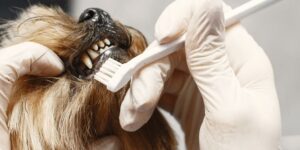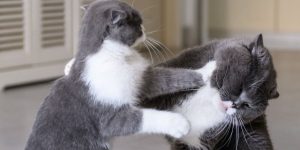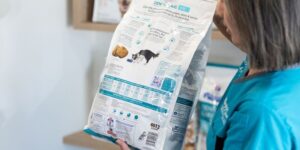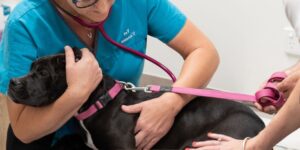Does your pet’s mouth experience gum bleeding (gingivitis) or brown-yellow discolouration of teeth (plaque or tartar)? If yes, then, your fur-baby will require a dental scale and polish under general anaesthetic. Performing this early may prevent your pet from having any extractions!
Good dental health (with a regular pet dental care plan) throughout your pet’s life will go a long way towards maintaining their overall health, comfort and quality of life.
Puppy and Kitten Dental Care
Whilst dental health might not be the first thing on your mind when you welcome a new furry friend into the household, it’s essential that your freshly-baked pet has their mouth vet-checked early on.
It is reasonably common for puppies (and sometimes kittens) to have abnormally aligned teeth, also known as malocclusions. Malocclusions can occur due to:
- Naturally “crooked” teeth, or crowded teeth due to one or several baby teeth not falling out before the emergence of their corresponding adult tooth
- A mismatch between the length of the upper and lower jaws, so that the lower jaw is either relatively too long or short compared to the upper
Cosmetic or Something More Serious?
Depending on the severity of their particular issue, affected pets might simply have a harmless cosmetic difference or may suffer from chronic dental problems or pain due to abnormal tooth-on-tooth contact or tooth-on-gum contact (where a misplaced tooth is digging into the palate or gum every time the animal closes its mouth – ouch!).
Vet Dental Assessment and Recommendations
Our vets will assess your pet’s mouth for any existing issues (such as malocclusions or broken teeth from naughty chewing shenanigans) at the time of their vaccinations, but may also recommend re-checks later on in case any baby teeth are abnormally retained.
In some cases, we will recommend an anaesthetic for the strategic extraction of problematic teeth, which are causing your fur-babies pain and discomfort, along with some good pain relief to ensure that your baby wakes up comfortably.
Adult Pet Dental Care
By around seven months old, your pet should have all their adult teeth, so it’s important to put in place a regular routine of dental hygiene maintenance and oral health checks. After all, we want to keep those permanent chompers clean, healthy and comfortable for years to come!
How To Maintain Pet Dental Hygiene
We recommend having a chat with us about the best way to maintain your pet’s dental hygiene long-term. Depending on your pet’s temperament, a good routine might involve a combination of:
- Tooth brushing, which many dogs can be gradually trained to accept, provided they have no pre-existing dental discomfort
- Safe dental chews
- Prescription dental diets
- Water or food additives
- Regular dental scale and polish under anaesthetic
Recommended Habits
It’s a good idea to get into the habit of checking your pet’s teeth at home every few weeks, so you can detect any developing dental disease or other oral lesions as early as possible.
Ideally, this should involve:
- Smelling your pet’s breath – if it smells unpleasant, it often suggests dental disease (or another health issue)
- Lifting your pet’s lips – gums should appear “salmon pink” (although they may have normal black pigmented areas too) and teeth should be white. If there is any gum redness (gingivitis) or brown-yellow discolouration of teeth (plaque or tartar), your pet will require a dental scale and polish under general anaesthetic. Performing this early may prevent your pet from having any extractions!
- Opening your pet’s mouth to check their tongue, gums and palate – any thickenings, wounds or lumps should be vet-checked promptly
Arrange Dental Care For Your Fur-baby
If you have any questions or concerns about your pet’s dental health, ask our knowledgeable vet team – we’re happy to give direction on all things dental!







